This is your third Agatha Christie adaptation. What is it about Ordeal By Innocence that makes it right for TV adaptation?
is ripe for TV adaptation because it has all the qualities of a show that is really going to draw people in. There is a family which is absolutely layered with some terrible, dark secrets. There is not one person in this family who doesn’t have a skeleton in their cupboard; who doesn’t have anything they don’t want someone else to know. Whether it’s a tiny secret, or a huge one that could topple an entire family. It’s a great premise.
Watch the trailer for Ordeal by Innocence
Do you think the fact you hadn’t read any of Agatha Christie was helpful to adapting her work?
Rather unusually, until I read , I’d never read any Agatha Christie. Although I was aware of the adaptations, I’d never watched any of them on TV. I did know that it was waspish and bitchy and glamorous and you knew that Marple and Poirot were sleuths and it was terribly English.
When I came to read And Then There Were None I was startled and shocked to find that they were in fact brutal. There was a cold and witty mind behind them. It struck me that instead of these being the parlour games of murder mysteries that I thought they were, that there was actually something else going on. Also because I’d never read any of the books before I didn’t have any of the sentimental attachment that you sometimes have for something you’ve read again and again. I think because And Then There Were None was a profoundly disturbing book that was the attitude I took and ran with it. To make sure that I’m confronted by their newness, not confronted by their sameness.

Arthur Calgary (LUKE TREADAWAY), Rachel Argyll (ANNA CHANCELLOR), Leo Argyll (BILL NIGHY), Kirsten Lindstrom (MORVEN CHRISTIE), Tina Argyll (CRYSTAL CLARKE), Hester Argyll (ELLA PURNELL), Mickey Argyll (CHRISTIAN COOKE), Mary Durrant (ELEANOR TOMLINSON), Jack Argyll (ANTHONY BOYLE), Gwenda Vaughan (ALICE EVE), Philip Durrant (MATTHEW GOODE) (l-r)
Where did you begin with the actual process of adaptation?
I always start with an image in my head. When I began to think about I had this image of Magritte and a man in a homburg, wearing a dark overcoat. He looks like a normal man going off to work and yet he’s stepping out into infinity, which is genuinely disturbing. I had this image of what could be seen as the English version of that which was somebody in a tweed coat, wearing a nice brown hat and carrying a suitcase stepping out into a choked and dangerous Eden. I was thinking so much about the 1950s and what it was like to live in this world where barely a decade ago we had the atomic bomb. We tend to think of the 1950s as being rather a dull time that is rather sunlit and innocent. Under the veneer of this you start to think about what is really happening at that time. You start to think about the rise in the number of people being prescribed sedatives at home; you start to think about the new advances in the way people are treated in psychiatric hospitals. You think about the way the government behaved; you think about the fact we had a young new Queen with a family and the whole idea of motherhood and femininity has been weaponised.
The idea that we all lived in peace following the Second World War is nonsense. I set the main portion of the drama in the summer of 1956 very deliberately because this is the summer before Suez; this is the summer before Hungary. So while we’re enjoying this rather red tooth and claw idyll of British life you remember that the world is changing incredibly rapidly.
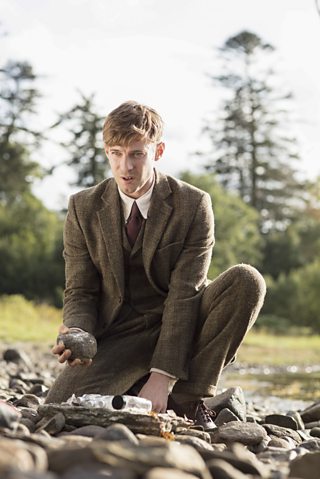
Arthur Calgary (LUKE TREADAWAY)(Image Credit: ±«Óãtv/Mammoth Screen/ACL/James Fisher Photographer: James Fisher)
Can you tell us about the character of Arthur and how he helps us, the viewer, enter into this dysfunctional family?
I’ve kept the premise from the book where arrives at Sunny Point to bring the news that was innocent. Arthur was Jack’s alibi and therefore someone else in the house must have murdered . In the book this character drops a bombshell, thinks to himself that everyone looks a little disturbed, wonders what’s going on but then leaves the house and goes to London.
When you’re writing an adaptation for television, you’re writing a drama, something has to happen which has drive. I wanted Arthur to have a story of his own which drives him forward, where there is a need for him to be able to deliver this piece of news that nobody wants to question. It is really important that he is able to do something and to make things right. I wanted to ask where has he been, why wouldn’t he be believed, what has he been doing, and how does that propel his story and make him trust people he shouldn’t trust and not trust people he should. I liked the idea that he is a kind of prophet walking in from the wilderness to tell a truth that nobody wants to hear.
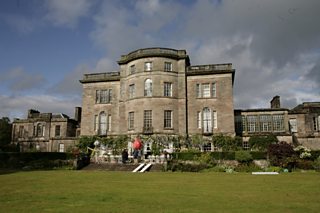
Image Credit: ±«Óãtv/Mammoth Screen/ACL/Victoria Brooks Photographer: Victoria Brooks
How does Sunny Point help you create that world and that feeling?
The house is always useful as a setting for the murder mystery, or what I like to think of as an enquiry on how we live in our particular ages via the genre of murder mystery. You have a pressure cooker and with a family house like this, every inch of it is filled with memory and meaning.
In Sunny Point they are still dominated by the absence of Rachel and the dynamic that informs their whole family and all the secrets they are trying to keep. It really does help because there isn’t anywhere where they can go. I always found that whatever you’re doing, if you can keep people in that pressure cooker, and deprive them of sleep they will do quite interesting things. Sunny Point is the name of a house you give when you want everyone to be happy and the thing is, you can’t click your fingers and make people be happy. That’s what was intriguing to me about writing Rachel, was how badly she wanted people to be happy. It was really interesting to write about those pressures on people to be perfect. And in terms of structure, what was most important about Sunny Point was that there was this sense that the staircase was where everything happened, that it had this atrium feeling, where a scream could travel up a staircase and be heard by everybody. It was also the idea that occupied both ends, so she was the alpha and omega of the entire sentence to the Argyll’s family life.
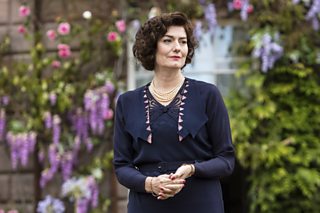
Rachel Argyll (ANNA CHANCELLOR)(Image Credit: ±«Óãtv/Mammoth Screen/ACL/James Fisher Photographer: James Fisher)
Can you describe the complexities of the character of Rachel?
At our script read-through someone said that they realised wasn’t a monster. I was genuinely shocked because I had never thought of her as a monster, I thought of her as a woman who had been betrayed and lied to; a woman who paints herself into this corner of brittle perfection.
When I first started working on the show I kept thinking, ‘What kills Rachel?’ Not who, but what kills, and what kills Rachel is the need to be perfect. I wanted to write this woman who appears to be impossible; who appears to be a real handful and who you’d have to put a gun to her head before she would admit what was wrong. Finding out that ticking time bomb of a secret is what explodes the whole drama.
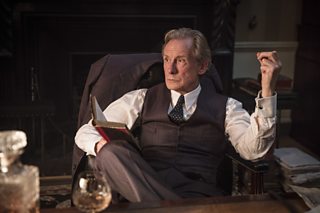
Leo Argyll (BILL NIGHY)(Image Credit: ±«Óãtv/Mammoth Screen/ACL/James Fisher)
With all of this pressure, it appears is breezing through life. Why is that?
In life, and with two parent families, there is always a parent who lays down the law. They are the ones that say ‘you can’t do this, and you’re not doing that’. Then there’s always a parent who comes in, who’s the favourite, who doesn’t have to make any of the rules and who doesn’t have to bear any of the consequences. Most of the time, the person who has to make all the rules is mum. I wanted that division of emotional labour, so Rachel is the one who says the way it’s going to be; everything is going to be perfect and we’re going to strive to be the very best so the world can see I’ve done the best any woman could ever do. Whereas all Leo had to do was be charming. I made the decision that Rachel wouldn’t be mummy, she would be mother but that Leo wouldn’t be father and he would be daddy. The person the children gravitated towards for fun, affection and jokes was Daddy and the person who said you will do your piano practice and you will sit up straight was Mother.
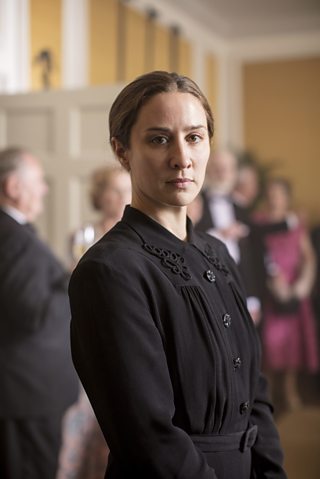
Kirsten Lindstrom (MORVEN CHRISTIE)(Image Credit: ±«Óãtv/Mammoth Screen/ACL/James Fisher)
Many of the characters get to play out their frustrations but with Kirsten so much of it is hidden. How did Morven perform in that role?
In one sense is another one of Rachel’s adopted children. Kirsten is from a Scottish Foundling ±«Óãtv who has come to the house to help with , the first adopted child. What comes out of that is a relationship between the matriarch and the servant. Kirsten really is the keeper of an incredibly violent secret. What you need is an actress who is able to walk the line between these layers of ambiguity. As I was writing this I kept thinking, Morven would be perfect because she is just an incredibly truthful and honest actress. I have never seen her play a false note in her life. She’s also incredibly intelligent at masking what the character is feeling because her character is not allowed to speak because of her status. That is what we needed, someone who drew the eye, who you knew was keeping something back. This is the person that conducts the music of the house and you’re never quite sure of her, ever.
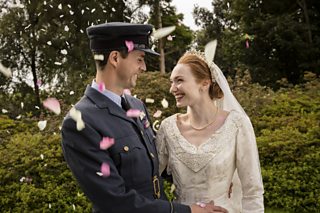
Philip Durrant (MATTHEW GOODE), Mary Durrant (ELEANOR TOMLINSON)(Image Credit: ±«Óãtv/Mammoth Screen/ACL/James Fisher)
How has the director brought this script to life?
Whenever I write a script, it is really important to me to know exactly what the atmosphere of the place is like. I want to know what the vantage points are, where the light falls, where the hiding places are, where the family congregate. So even if you’re not going to be able to replicate that exactly on screen there is still a strong sense of that.
It was so important to me that Sandra was absolutely tuned into that sense of family and that sense of the brooding sarcophagus of a house, which was beautiful but also claustrophobic. What Sandra brought to it was this really finely tuned ear for the shifts in pitch and tone in a conversation, the music of the dialogue, the music of what isn’t being said. I could say things to her about the way a character carries a suitcase and she would absolutely understand what I meant. Or I could write a stage description about the way railway tracks curve around a corner into the pinewoods of the forest and she understood exactly what I was talking about, without having to discuss the significance. She was so attuned to the tiny nuances of what was going on between characters that I trusted her and trusted her choices. That was brilliant for me because I could sit back and relax while I knew that she was taking everything forward and thinking hard about every little tiny thing even down to the mood changes half way through a line of dialogue.
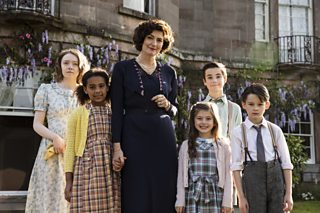
(l-r) Young Mary ( CATRIONA MACNICOLL), Young Tina ( ABIGAIL CONTEH), Rachel Argyll ( ANNA CHANCELLOR), Young Hester ( HAYDEN ROBERTSON), Young Mickey ( RHYS LAMBERT), Young Jack ( LUKE MURRAY)(Image Credit: ±«Óãtv/Mammoth Screen/ACL/James Fisher)
How have you tried to move Agatha Christie on? Was it a discussion before the adaptations started?
I made a strong case when I went to pitch my ideas for And Then There Were None about what I wanted to do. I didn’t have a pre-existing relationship with Agatha Christie, because I don’t see it as my job to serve her hagiography. What I want to know is what happens with these characters. I don’t care whodunit; I want to know why they did it. Why is this person dead?
The more familiar we get with something the less we find them shocking. I want people to be shocked because they’re about the times that we live in. At the forefront of my mind was that one could write these stories about the 20’s, the 30’s, the 40’s, the 50’s and it might help us see, and understand, some quality about the blood soaked tumultuous 20th century, which might make us understand why we’re in such a damn mess in the 21st. I wanted to adapt Christie’s stories in a way I see right; how I react to them, not what anybody else has seen before.
Also Agatha Christie Limited, and have been so on my side and completely get where I am coming from. I think they can see that it’s really going somewhere and that I’m not just kicking the table over for the sake of it. It is about re-examining the imagination of somebody who is a British icon.
This interview was first published on the ±«Óãtv's Media Centre.
Inside the Writer's Room:
and
